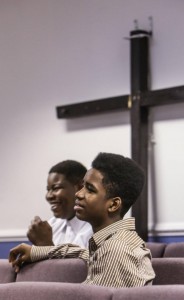 In a Sept. 28 article published by the Barna Group, “Six Reasons Young Christians Leave Church,” Barna, a nationally respected non-profit research organization dedicated to spiritual development, outlines six reasons why young people stay away from churches:
In a Sept. 28 article published by the Barna Group, “Six Reasons Young Christians Leave Church,” Barna, a nationally respected non-profit research organization dedicated to spiritual development, outlines six reasons why young people stay away from churches:
Churches seem overprotective:
While many churches try to convince members to reject or avoid “worldly” influences, today’s young people are more connected to culture, media and concerns of the world than ever.
Their experience of Christianity is shallow:
Young people respond in surveys that they find church “boring,” “not relevant to career or interests” and “God seems missing from my experience of church.”
Churches seem antagonistic to science:
In general, churches they perceive as opposed to science and reason turn off young people.
What churches teach about sexuality is all too often simplistic and judgmental:
Research suggests that self-identified Christian young people are as sexually active as non-Christians. They find that what many churches preach regarding this important aspect of life is based on fear and prejudice.
Young people reject the exclusive nature of Christianity:
Whether it is the homogeneity of a congregation’s ethnicity and social class or the doctrines of exclusive salvation offered by certain churches, today’s young person values tolerance, open-mindedness and acceptance more than ever.
Churches don’t encourage or allow doubts:
At a time in personal development when young people question everything, churches that “have all the answers” are often described as trivial and intolerant.
In the Barna survey, 36 percent of respondents suggested that they are not able to “ask my most pressing life questions in church.”
As a pastor in one of the many mainline Protestant denominations in rapid institutional decline, such conclusions get my attention. If young people are giving up on the church, the church has no future.
The reality of decline in religious affiliation in North America is a complicated issue that reflects a number of changes in the religious life of our society, which still expresses a 94 percent belief in God. According to the Pew Forum Religion Survey (www.pewforum.org), the fastest-growing segment of the American population identify themselves as “spiritual, not religious.”
To put it bluntly, more and more North Americans don’t find religious institutional life relevant to their spirituality. That’s across the board: liberal, conservative, progressive, evangelical and orthodox.
It’s not that North Americans aren’t spiritual, it’s that they don’t find church life necessary for their spirituality.Seminaries of all persuasions have recorded successive years of decline in their enrollments. One could conclude that it’s not that North Americans aren’t spiritual, it’s that they don’t find church life necessary for their spirituality.
The Barna conclusions about young people leaving the church sadly seem accurate to this preacher. As a simplistic example, every Sunday the most contested subject is the musical selection. Folks older than 50 get upset if we don’t sing the old traditional hymns, folks younger than 50 complain if we don’t sing the new contemporary songs enough.
To young people, being the church is more important than attending one. The Rev. Douglas Anderson, executive director of the Bishop Rueben Job Center for Leadership Development at Dakota Wesleyan University, once said, “When the mission of a church becomes the maintenance of its property … when the mission of a church becomes the preservation of its preferences … then the end of that church is in sight.”
If we over 50 insist that the next generations do church just as we did when we were young, we will continue to lose them. As United Methodist Bishop Robert Schnase said not too long ago, “Maybe those under 50 years old do not share our passion for the hymns of 18th century European males as we established church folk do!”
Those churches that will survive and thrive in this new day will worship in unexpected places, with unexpected people in new and unexpected forms. Young Americans are seeking spiritual integrity, compassion, real experience and a place that encourages their questions. Being the church will be more important than attending one.
Maybe that is what young people have been looking for all along.
By Rev. Dr. Mark S. Bollwinkel, Senior Pastor of Los Altos United Methodist Church, Los Altos, CA. Reposted with permission.